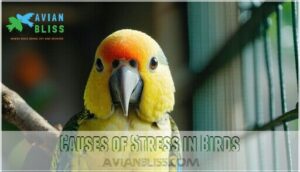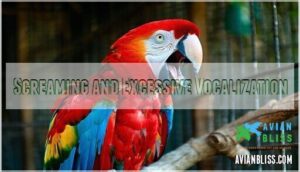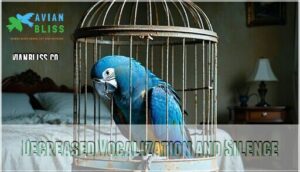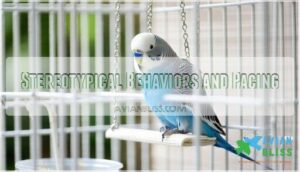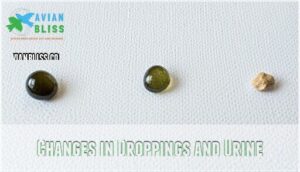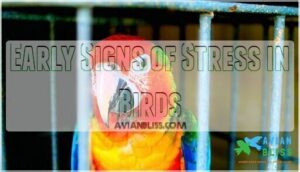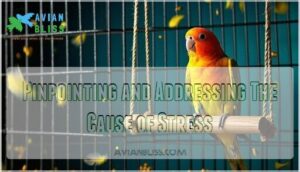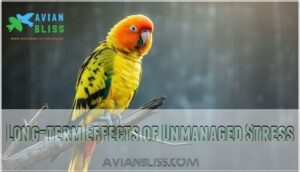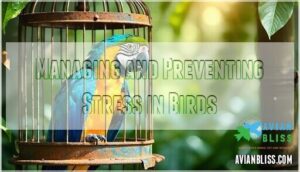This site is supported by our readers. We may earn a commission, at no cost to you, if you purchase through links.
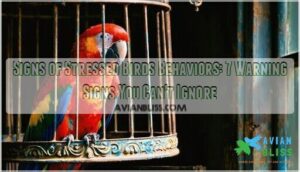
Watch for destructive habits like feather plucking, self-mutilation, or aggressive biting and lunging. Physical changes include weight loss, altered droppings, and decreased appetite.
Stressed birds often display repetitive behaviors like pacing, along with trembling or unusual crouching. Changes in sleep patterns and increased fearfulness are also telltale indicators.
These behaviors can stem from environmental changes, medical issues, or inadequate social interaction. Understanding what triggers these responses helps protect your bird’s wellbeing, and recognizing signs like excessive screaming and decreased appetite is crucial for timely intervention to prevent further distress.
Table Of Contents
- Key Takeaways
- Recognizing The Signs of a Stressed Bird
- Causes of Stress in Birds
- Behavioral Signs of Stress in Birds
- Physical Signs of Stress in Birds
- Early Signs of Stress in Birds
- Pinpointing and Addressing The Cause of Stress
- Long-term Effects of Unmanaged Stress
- Managing and Preventing Stress in Birds
- Veterinary Care and Treatment for Stressed Birds
- Frequently Asked Questions (FAQs)
- How do birds act when stressed?
- How do I know if my bird has anxiety?
- How do you comfort a stressed bird?
- How do you know if a bird is stressed?
- What are some signs of stress?
- How do birds exhibit stress?
- Do birds feel stressed or depressed?
- Are birds a stressor?
- How do birds cope with stress?
- How to tell if a bird is in distress?
- Conclusion
Key Takeaways
- Watch for behavioral warning signs – You’ll see excessive screaming or unusual silence, defensive biting and lunging, feather plucking, and repetitive pacing that signal your bird’s distress.
- Monitor physical changes closely – You cannot ignore weight loss, altered droppings, decreased appetite, trembling, and crouching behaviors that indicate serious stress.
- Address root causes immediately – You need to identify triggers like environmental changes, poor nutrition, lack of social interaction, or medical issues before they escalate.
- Seek professional help when needed – You should consult an avian veterinarian for persistent symptoms, as untreated stress leads to compromised immunity, reproductive issues, and long-term health problems.
Recognizing The Signs of a Stressed Bird
You’ll notice your feathered friend’s distress through several unmistakable behavioral changes that signal something’s wrong in their world.
These warning signs range from subtle shifts in daily habits to more obvious displays of anxiety that demand your immediate attention.
Changes in Vocalization Patterns
When your bird’s vocal patterns suddenly shift, it’s often the first clear warning sign of stress.
These vocal changes can range from complete silence to excessive screaming.
- Alarm calls – Sharp, repetitive warning sounds indicate fear or anxiety
- Reduced chirping – Unusual quietness signals depression or illness
- Screaming causes – Persistent loud vocalizations suggest distress or boredom
- Silence signals – Complete vocal shutdown often indicates severe stress
- Vocal changes – Any deviation from normal patterns warrants attention
Biting or Lunging Behavior
When your bird suddenly starts biting or lunging, it’s signaling distress rather than true aggression.
Your bird’s sudden biting isn’t aggression—it’s their way of screaming "Help me!
These fear responses often stem from biting triggers like environmental changes, pain, or uncertainty. Redirected aggression may occur when birds can’t escape stressful situations.
Watch for warning bird aggression signs including raised feathers, dilated pupils, or defensive postures. A cramped cage can exacerbate underlying behavioral issues.
Early intervention prevents escalation—identify triggers first. Gentle training techniques using positive reinforcement help rebuild trust and reduce bird biting behaviors effectively.
Feather Picking and Plucking
Feather picking reveals your bird’s internal distress through visible self-destructive behaviors.
When stressed birds pluck their own feathers, they’re communicating emotional turmoil that requires immediate attention.
Recognizing plucking severity helps determine appropriate intervention strategies:
- Underlying Causes – Environmental changes, nutritional deficiencies, or medical conditions trigger feather plucking birds
- Behavioral Solutions – Enrichment activities and social interaction reduce stressed bird behaviors substantially
- Prevention Methods – Proper diet and stable routines support healthy feather regrowth patterns
Bird self-mutilation escalates without proper intervention.
Self-Mutilation and Skin Damage
When feather picking escalates, you’re witnessing your bird’s most desperate cry for help.
Bird self-mutilation involves chewing skin and muscle tissue, creating open wounds with serious infection risk and permanent scarring effects.
This behavioral roots crisis requires immediate wound care, pain management, and veterinary intervention.
Feather plucking birds showing self-destructive behaviors need urgent professional assessment to prevent life-threatening complications from developing further.
Often, these behaviors are linked to nutritional and dietary deficiencies, which can be a critical factor in addressing the issue.
Decreased Appetite and Weight Loss
Weight-loss warnings become evident when your bird’s eating habits shift dramatically.
Metabolic issues and anorexia signs manifest through reduced food consumption, leaving favorite treats untouched, and visible bird weight loss.
These decreased appetite birds behaviors indicate serious bird stress signs requiring immediate attention.
Dietary changes, malabsorption, and potential organ failure make decreased appetite a critical bird stress indicator demanding veterinary evaluation.
Causes of Stress in Birds
Understanding what triggers stress in your bird is essential for preventing behavioral problems before they escalate.
Common causes range from environmental changes and inadequate social interaction to nutritional deficiencies and underlying health issues that require immediate attention, including behavioral problems.
Environmental Changes and Stressors
Your bird’s sanctuary can become a source of anxiety when environmental changes disrupt their familiar world.
Cage relocation, home renovations, new pets, and loud noises trigger immediate bird stress responses.
Visual changes like repainting walls startle sensitive birds, while unfamiliar sounds from windows create lasting bird behavioral changes that affect their sense of security.
Lack of Attention and Social Interaction
Why do companion birds develop social withdrawal when their interaction needs go unmet?
Social deprivation triggers loneliness effects that manifest as bird stress and destructive bird behavior patterns.
Address lack of attention through these boredom prevention strategies:
- Daily interaction sessions – Schedule consistent one-on-one time for bird attention and bonding
- Family inclusion – Let your bird observe household activities to satisfy bird social needs
- Vocal engagement – Talk to your bird throughout the day to prevent social isolation
- Supervised exploration – Provide safe out-of-cage time for environmental stimulation and connection
- Routine establishment – Create predictable schedules that reinforce security and reduce anxiety
Nutritional Deficiencies and Imbalances
Beyond social needs, your bird’s diet directly shapes its stress levels. Bird nutritional deficiencies create cascading health problems that manifest as anxiety and behavioral changes.
Poor bird diet lacking essential vitamins triggers metabolic disorders affecting organ function. When birds experience bird malnutrition, their bodies can’t cope with daily stressors effectively. Deficiencies in key nutrients can even lead to metabolic bone disease, further compromising their health.
| Deficiency Type | Physical Signs | Behavioral Impact |
|---|---|---|
| Vitamin A | Eye discharge, poor feathers | Increased aggression, fear |
| Protein | Weight loss, muscle wasting | Repetitive behaviors, lethargy |
| Calcium | Soft bones, egg binding | Excessive vocalization, trembling |
| Iron | Pale tissues, weakness |
Reduced activity, poor appetite.
Toxin exposure from inappropriate foods compounds these issues. Smart supplementation strategies and monitoring bird appetite changes help maintain ideal bird wellbeing. The dietary impact on stress can’t be overstated.
Insufficient Enrichment and Stimulation
Birds need bird stimulation to prevent bird stress and bird boredom.
Without proper toy rotation and foraging opportunities, your feathered friend faces social deprivation and lacks cognitive challenges.
Smart environmental design includes varied bird toys that encourage natural behaviors.
A stimulating bird environment with puzzles, swings, and interactive elements keeps minds active and reduces stereotypical behaviors that signal distress.
Underlying Medical Conditions
Hidden illnesses often masquerade as stress symptoms, creating a confusing puzzle for bird owners.
Your bird’s mysterious symptoms might be hiding a serious illness that needs immediate veterinary attention.
Pain Management becomes essential when avian health conditions like infections or organ dysfunction trigger stress-like behaviors.
Your veterinarian will recommend Diagnostic Testing including blood work to identify underlying bird illness.
Medication Side-effects require careful monitoring, but proper veterinary care substantially improves Prognosis Implications for your feathered companion’s recovery.
Behavioral Signs of Stress in Birds
When your bird’s behavior suddenly changes, it’s often their way of telling you something’s wrong.
Understanding these behavioral warning signs helps you catch stress early before it becomes a serious health problem.
Screaming and Excessive Vocalization
Excessive vocalization often reveals your bird’s inner turmoil. Distress signals manifest as persistent screeching, alarm calls, or boredom screaming that differs from normal communication.
Species differences matter—cockatiels whistle when stressed while macaws shriek. Attention seeking through bird vocalization indicates unmet needs.
Watch for vocalization changes: repetitive patterns, intensity shifts, or timing alterations signal bird stress. These vocalization types require immediate environmental assessment and enrichment adjustments.
Decreased Vocalization and Silence
When your once-chatty companion turns into a Silent Bird, this vocalization decline often signals deeper issues than simple mood changes. Decreased vocalization represents a significant bird stress indicator that shouldn’t be overlooked.
Bird vocalization changes manifest through these concerning patterns:
- Complete silence from previously talkative species like cockatoos or African greys
- Gradual reduction in normal calling, singing, or contact vocalizations
- Missing morning greetings or evening chatter that once defined your bird’s routine
- Withdrawal from vocal interactions during typical social periods
This illness indicator frequently accompanies depression signs or reveals boredom impact on your feathered friend. Normal vocalization patterns vary by species, but sudden shifts in bird vocalizations warrant immediate attention to prevent escalating health concerns.
Stereotypical Behaviors and Pacing
When silence gives way to restless motion, you’re witnessing stereotypical behavior in action.
Bird pacing along perch edges, repetitive head-swinging, and toe-tapping reveal boredom indicators that shouldn’t be ignored.
These repetitive movements stem from environmental deprivation and signal your cage bound bird needs immediate enrichment.
Pacing reasons include lack of mental stimulation and social interaction, making early intervention essential.
Aggression and Biting Behavior
Your bird’s biting triggers often signal fear rather than true aggression.
Watch for lunging during cage cleaning or when strangers approach—classic fear biting responses.
Species differences matter; cockatoos bite differently than finches.
Redirecting aggression works better than punishment.
Use gentle handling techniques like the "step-up" command, and address underlying bird stress through environmental changes and consistent routines.
Physical Signs of Stress in Birds
While behavioral changes often grab attention first, your bird’s physical appearance provides equally important clues about stress levels.
You’ll notice these physical signs most clearly by observing changes in weight, feather condition, and bodily functions like droppings, which can indicate overall health and well-being.
Weight Loss and Nutritional Deficiencies
Weight loss becomes alarming when your bird drops even a few grams. Stress disrupts appetite and metabolism, creating dangerous nutritional deficiencies that compound health problems.
Watch for decreased appetite, anorexia signs, and metabolic disorders that indicate serious malnutrition effects.
- Track bird weight loss weekly using digital scales
- Address dietary imbalances with varied, high-quality nutrition
- Consult veterinarians about supplementation needs for recovery
Changes in Droppings and Urine
Beyond weight loss, your bird’s droppings reveal vital stress in birds indicators. Frequency alterations and volume changes often appear first—stressed birds may defecate more frequently due to anxiety.
| Dropping Change | What It Means |
|---|---|
| Fecal Consistency | Watery or loose suggests bird diarrhea stress |
| Urate Color | Green/yellow indicates liver stress or poor appetite |
| Volume Changes | Increased liquid portion signals polyuria from stress |
| Dehydration Signs | Reduced output warns of serious health concerns |
Monitor these bird stress symptoms daily. Droppings can also be a transmission route for diseases, so it’s important to be aware of potential health threats. Droppings that stay abnormal beyond dietary changes need immediate veterinary attention to prevent complications.
Early Signs of Stress in Birds
Catching stress early in your feathered friend can mean the difference between a quick recovery and serious health complications.
These subtle warning signs often appear days or weeks before more obvious symptoms, giving you a vital window to intervene and help your bird feel secure again, which can lead to a quick recovery.
Crouching, Flattening, and Trembling
When you spot your bird crouching, flattening feathers, or trembling, you’re witnessing anxiety indicators that signal fear response.
These body language cues reveal stress in birds through subtle physical changes that require immediate attention.
Watch for these severity levels:
- Hunched posture with flattened feathers against the body
- Trembling wings or legs indicating medical mimicry concerns
- Rapid head movements showing heightened alertness
- Stiff positioning that differs from normal perching behavior
These stressed birds display clear bird stress signals through crouching and trembling behaviors that indicate underlying distress.
Changes in Appetite and Water Intake
While physical postures reveal immediate distress, appetite changes and water intake shifts provide equally telling signs of stress in birds. Sudden anorexia often appears first, where your feathered friend picks at food without actually eating. You’ll notice scattered pellets around the cage but an unchanged food level.
Decreased appetite paired with increased thirst signals your bird’s struggling with stress-related dehydration signs. Some birds develop new food preferences, rejecting previously loved treats. Others stop drinking entirely, creating dangerous dehydration. A key indicator can be changes in droppings, which may signal digestive issues.
Weight monitoring becomes critical here—stress causes rapid weight loss that’s hard to reverse once advanced.
Track daily consumption patterns to catch stress behaviors early.
Changes in Sleep Patterns and Activity
Sleep disruptions signal serious stress in your feathered friend. Night Frights cause sudden panicked movements, while Restless Sleep leaves birds fidgeting on perches.
You’ll notice Reduced Activity during typical play hours or Increased Drowsiness throughout the day.
These bird sleep changes reflect an Altered Rhythm that disrupts natural patterns.
Lethargic bird behavior replaces normal curiosity and energy.
When bird stress affects sleep cycles, bird anxiety often follows, creating a cycle that requires immediate attention.
Increased Aggression and Fear
When stressed birds feel cornered, fear biting and lunging triggers become their go-to defense mechanisms.
These aggression causes stem from anxiety, not malice. Watch for avoidance behavior like backing away or wing-flapping warnings before attacks occur.
Fear responses in stressed birds include dilated pupils and raised feathers. Creating predictable routines and speaking softly helps reduce aggression episodes.
Remember, biting represents communication, not hatred—your bird stress management determines their comfort level.
Pinpointing and Addressing The Cause of Stress
Once you’ve spotted the warning signs, you’ll need to play detective to uncover what’s triggering your bird’s stress response.
The key lies in systematically examining their environment, diet, social needs, and health status to identify the root cause and implement targeted solutions.
Identifying Environmental Stressors
Environmental changes can turn your bird’s world upside down faster than you’d expect.
Your feathered friend’s Noise Sensitivity makes them vulnerable to sudden disruptions, while Visual Changes like new furniture or Cage Placement shifts trigger anxiety responses.
Stress Triggers include:
- Routine Changes – altered feeding times or lighting schedules
- New Animals – introducing pets without gradual acclimation
- Environmental Changes – loud construction or frequent visitors
Effective Stress Management starts with recognizing these Stress Causes early.
Addressing Nutritional Deficiencies
Addressing Dietary Imbalances starts with recognizing how poor bird nutrition directly impacts stress levels. Vitamin Supplements won’t fix everything—you need thorough nutritional deficiencies prevention through varied foods.
| Deficiency Type | Stress Symptoms | Solution |
|---|---|---|
| Vitamin A | Respiratory issues, feather picking | Dark leafy greens, orange vegetables |
| Calcium/D3 | Tremors, seizures, aggression | Fortified pellets, supervised sunlight |
| Omega-3 fatty acids | Anxiety, poor feather quality | Hemp seeds, walnuts in moderation |
| Complete protein | Muscle weakness, irritability | High-quality pellets, legumes |
Mineral Deficiencies create cascading health problems. Obesity Concerns from seed-only diets worsen stress responses.
Encourage natural Foraging Behavior by hiding healthy foods throughout your bird’s environment—this supports both bird stress dietary needs and mental stimulation simultaneously.
Providing Sufficient Enrichment and Stimulation
Mental stimulation prevents bird stress through strategic environmental design and cognitive challenges.
Provide foraging opportunities using puzzle feeders and hidden treats to mimic natural behaviors. Consider using innovative feeding solutions to further enrich their environment.
Implement toy rotation weekly, offering different textures and sounds to combat bird boredom.
Social interaction through training sessions creates mental engagement while strengthening your bond. These enrichment activities reduce stereotypical behaviors and promote bird mental stimulation effectively, which is a key aspect of mental stimulation.
Consulting a Veterinarian
When enrichment falls short, professional veterinary care becomes essential for stressed birds.
An avian specialist can identify hidden medical issues through thorough diagnostic tests and bird veterinary examination.
Here’s what to expect during a bird stress veterinary consultation:
- Thorough physical examination checking for signs of illness or injury
- Blood work and diagnostic tests to rule out underlying health conditions
- Behavioral assessment to identify stress triggers and patterns
- Treatment options including medication or environmental modifications
- Preventative care plan to maintain your bird’s long-term health
Emergency signs like self-mutilation or severe appetite loss require immediate bird veterinary attention.
Your avian veterinarian will develop customized solutions addressing both physical and behavioral aspects of stress.
Long-term Effects of Unmanaged Stress
When you ignore your bird’s stress signals, you’re setting the stage for serious health consequences that can permanently damage their wellbeing.
Chronic stress doesn’t just affect behavior—it creates a cascade of physical problems that can shorten your feathered friend’s lifespan and require expensive veterinary intervention to address the resulting chronic issues.
Weight Loss and Malnutrition
When chronic stress takes hold, weight loss becomes a devastating consequence that threatens your bird’s survival. Dietary imbalances and malnutrition effects create a dangerous cycle where appetite changes lead to severe nutritional deficiencies. Stressed birds often develop metabolic issues that prevent proper nutrient absorption, making supplementation needs critical.
Watch for subtle eating habits shifts before dramatic weight loss occurs.
- Weigh your bird weekly using a gram scale
- Document daily food consumption and waste patterns
- Provide high-calorie foods during recovery periods
- Consult an avian veterinarian for targeted diet modifications
Reproductive Issues and Infertility
Something’s wrong when your bird’s reproductive system goes haywire from stress. Hormonal imbalance disrupts normal breeding cycles, causing infertility and egg binding – a potentially fatal condition where eggs can’t pass through the oviduct.
| Stress Effect | Reproductive Impact | Risk Level |
|---|---|---|
| Breeding Stress | Reduced fertility rates | Moderate |
| Egg Binding | Life-threatening blockage | Critical |
| Chick Mortality | Poor hatching success | High |
| Infertility Causes | Complete breeding failure | Severe |
| Hormonal Imbalance | Disrupted egg production | Moderate |
Chronic stress compromises bird reproduction by interfering with natural bird egglaying patterns. Your bird eggbound situations require immediate veterinary intervention. These bird reproductive issues stem from elevated stress hormones that basically shut down the reproductive system, protecting your bird’s survival over breeding success.
Compromised Immune System
Beyond reproductive problems, chronic stress devastates your bird’s immune system, creating a domino effect of health issues.
Infection susceptibility skyrockets as reduced antibodies leave your feathered friend vulnerable to diseases that healthy birds easily fight off. The autoimmune response becomes unpredictable, while vaccination efficacy drops substantially.
Your bird’s gut microbiome—the foundation of immunity—becomes imbalanced, compromising overall defenses.
- Monitor for frequent respiratory infections – stressed birds catch colds and bacterial infections more easily
- Watch vaccination responses – stressed birds may not develop proper immunity after routine shots
- Track recovery times – healthy birds bounce back quickly, while stressed ones struggle with prolonged illness
Managing and Preventing Stress in Birds
Once you’ve identified stress in your bird, taking immediate action can prevent serious health complications and restore their well-being.
The key lies in addressing the root causes while creating an environment that supports both physical and emotional health, which is crucial for their overall well-being.
Providing a Nutritious and Varied Diet
While addressing long-term stress effects prevents severe health complications, dietary variety becomes your bird’s first line of defense.
Fresh foods like leafy greens, colorful vegetables, and seasonal fruits provide essential nutrients that combat nutritional deficiencies. High-quality pellets should form your bird diet’s foundation, supplemented with appropriate seeds and treats.
You can find many types of bird pellets designed for ideal nutrition.
| Food Category | Examples |
|---|---|
| Fresh Vegetables | Broccoli, carrots, sweet potato |
| Safe Fruits | Apple, berries, mango |
| Quality Pellets | Species-specific formulations |
| Healthy Seeds | Sunflower, millet, pumpkin |
| Leafy Greens | Kale, spinach, dandelion |
Portion control prevents obesity while ensuring adequate nutrition. Supplement needs vary by species, so consult your avian veterinarian.
Proper bird foods reduce bird stress substantially.
Creating a Safe and Stress-Free Environment
Establish your bird’s safe space by prioritizing cage placement away from high-traffic areas and sudden environmental changes.
Your feathered friend needs draft protection and noise reduction to feel secure in their bird cage.
Consider these essential elements for bird stress relief:
- Routine Consistency – Maintain regular feeding, lighting, and interaction schedules to build trust
- Gradual Introductions – Slowly introduce new people, pets, or changes over several days
- Strategic Positioning – Place the cage against a wall for security while ensuring good visibility
This thoughtful approach creates the foundation for enrichment and long-term well-being.
Offering Enrichment and Stimulation
Mental stimulation prevents stereotypical behaviors that signal bird stress relief needs.
Your bird cage becomes a playground when you implement strategic enrichment:
- Toy Rotation: Weekly swaps prevent boredom and maintain curiosity
- Foraging Opportunities: Hide treats in paper cups or tissue for natural hunting behaviors
- Cognitive Games: Puzzle feeders challenge problem-solving skills through positive reinforcement
- Environmental Design: Varied perch textures and heights encourage exploration
These enrichment strategies directly combat stress-related behaviors while promoting healthy Social Interaction patterns.
Encouraging Social Interaction and Attention
Social interaction serves as your bird’s emotional lifeline.
Daily conversations, gentle handling, and shared activities prevent bird social withdrawal while meeting essential bird attention needs.
Lack of attention triggers destructive behaviors, but positive reinforcement during playtime builds trust.
Consider companion birds for highly social species to reduce isolation through natural bird companionship.
| Bonding Activities | Benefits |
|---|---|
| Daily conversations | Prevents social withdrawal |
| Gentle head scratches | Builds trust and affection |
| Shared meal times | Strengthens natural bonds |
| Interactive play sessions | Reduces behavioral problems |
Veterinary Care and Treatment for Stressed Birds
When your bird’s stress behaviors persist despite environmental adjustments, professional veterinary intervention becomes essential for proper diagnosis and treatment.
An avian veterinarian can identify underlying medical conditions contributing to stress and develop a thorough treatment plan designed to meet your bird’s specific needs.
Thorough Veterinary Examination
When your bird shows concerning stress behaviors, seeking an avian veterinarian becomes essential for proper diagnosis and care.
These specialized professionals conduct thorough evaluations to identify underlying causes of behavioral changes and develop effective treatment strategies.
- Physical Examination – Complete body assessment including weight, posture, and feather condition
- Behavioral Assessment – Detailed evaluation of stress-related behaviors and environmental factors
- Diagnostic Testing – Laboratory work to rule out medical conditions causing stress
- Treatment Options – Customized therapy plans addressing specific bird health issues
- Preventative Care – Ongoing monitoring strategies to prevent future stress in birds
Blood Tests and Diagnostic Procedures
Accurate diagnosis starts with thorough testing that reveals what’s happening beneath the surface. Your avian veterinarian will recommend specific blood tests and diagnostic procedures to identify underlying causes of bird stress and health issues.
CBC Analysis examines blood cell counts, detecting infections or immune system problems. Biochemical Profiles measure organ function, revealing liver or kidney issues that contribute to stress behaviors. Avian Diagnostics include specialized tests for diseases common in pet birds.
Parasite Detection through fecal exams identifies intestinal worms or protozoa affecting digestion and appetite. Disease Screening catches viral infections like PBFD or psittacosis early, before symptoms worsen. Early detection can also help manage respiratory tract infections, which can substantially impact a bird’s well-being.
These thorough tests help your veterinarian understand whether feather picking stems from nutritional deficiencies, if lethargy indicates organ dysfunction, or if behavioral changes signal underlying bird medical issues affecting your bird’s wellbeing.
Medication and Treatment Options
Veterinary intervention becomes vital when your bird shows persistent stress symptoms.
Your vet can prescribe targeted solutions to restore your feathered friend’s well-being and prevent further complications.
- Anti-Anxiety Meds like fluoxetine help reduce compulsive feather picking and obsessive behaviors
- Pain Management medications such as meloxicam address underlying discomfort causing stress reactions
- Hormone Therapy can regulate reproductive behaviors and reduce territorial aggression in breeding birds
- Supplement Options including B-complex vitamins and calming herbal blends support emotional stability
- Emergency Care protocols guarantee immediate intervention for self-mutilation or severe behavioral crises
Behavioral Therapy and Training
Beyond medication, behavioral therapy transforms how your bird responds to stressors through proven bird training methods.
Positive reinforcement training rewards calm behaviors while target training builds confidence.
Desensitization techniques gradually expose birds to triggers, and counter conditioning creates positive associations.
These bird stress behavior modification approaches help you redirect problematic behaviors, creating lasting behavioral changes that support your bird’s emotional well-being.
Frequently Asked Questions (FAQs)
How do birds act when stressed?
Like feathers falling from a troubled nest, stressed birds exhibit clear warning signs you can’t miss.
They’ll bite defensively, scream excessively or go unnaturally quiet, pluck their feathers, tremble, crouch low, and lose their appetite completely.
How do I know if my bird has anxiety?
Your bird’s anxiety shows through feather plucking, excessive screaming or unusual silence, crouching with flattened feathers, trembling, biting when approached, decreased appetite, and repetitive behaviors like pacing.
How do you comfort a stressed bird?
Create a calm environment by moving your bird’s cage to a quiet area, dimming lights, and speaking softly.
Offer favorite treats, maintain routine, and provide enrichment toys while avoiding sudden movements.
How do you know if a bird is stressed?
You’ll notice stressed birds through behavioral changes: excessive screaming or unusual silence, feather plucking, biting, trembling, crouching with flattened feathers, appetite loss, and repetitive behaviors like pacing.
What are some signs of stress?
When your feathered friend acts like a canary in a coal mine, watch for biting, excessive screaming, feather picking, decreased appetite, trembling, and repetitive behaviors that signal distress.
How do birds exhibit stress?
You’ll notice stressed birds through feather plucking, excessive screaming or unusual silence, biting behaviors, decreased appetite, trembling, and repetitive movements that signal underlying anxiety or discomfort.
Do birds feel stressed or depressed?
Like emotional barometers responding to life’s pressures, you’ll find that birds absolutely experience stress and depression.
They show decreased appetite, feather-picking, excessive screaming, or withdrawal when overwhelmed by environmental changes or inadequate care, which can be a clear sign of depression.
Are birds a stressor?
Birds can become stressors for some people through noise complaints, property damage, or triggering bird phobias. However, they’re typically not inherently stressful when properly cared for and understood.
How do birds cope with stress?
Your feathered friend’s inner compass spins wildly when overwhelmed.
Birds cope through behavioral adaptations like hiding, reduced activity, preening for comfort, seeking familiar objects, and using vocalizations to communicate distress or seek reassurance from companions, which can include vocalizations to express their needs and preening for self-soothing.
How to tell if a bird is in distress?
Watch for excessive screaming, sudden silence, feather plucking, biting, loss of appetite, trembling, or crouching. These behaviors signal your bird needs immediate attention and possible veterinary care.
Conclusion
Will you continue overlooking the signs of stressed birds behaviors until it’s too late?
Recognizing these warning signals isn’t just helpful—it’s essential for your feathered companion’s health.
From excessive screaming to feather plucking, these behaviors signal distress that demands immediate attention.
By understanding triggers like environmental changes, poor nutrition, or medical issues, you’re equipped to create a safer, happier environment.
Early intervention prevents long-term damage and strengthens your bond with your bird companion.
- https://www.sanfranciscobirdhotel.com/post/6-signs-your-bird-is-stressed-and-what-you-can-do-about-it
- https://petdoctorvet.com.au/latest-news/birds-stress-identifying-managing-stress-pet-birds/
- https://www.petmd.com/bird/behavior/how-tell-if-your-bird-unhappy-or-stressed-and-what-do
- http://www.riverlandingsanimalclinic.com/news/2019/12/17/common-signs-of-stress-in-birds
- https://www.floridamuseum.ufl.edu/science/noise-pollution-causes-stress-in-birds/

